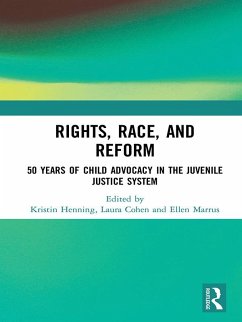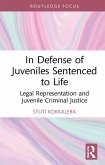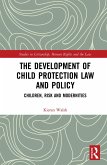Rights, Race, and Reform (eBook, ePUB)
50 Years of Child Advocacy in the Juvenile Justice System
Redaktion: Henning, Kristin; Marrus, Ellen; Cohen, Laura
42,95 €
42,95 €
inkl. MwSt.
Sofort per Download lieferbar

21 °P sammeln
42,95 €
Als Download kaufen

42,95 €
inkl. MwSt.
Sofort per Download lieferbar

21 °P sammeln
Jetzt verschenken
Alle Infos zum eBook verschenken
42,95 €
inkl. MwSt.
Sofort per Download lieferbar
Alle Infos zum eBook verschenken

21 °P sammeln
Rights, Race, and Reform (eBook, ePUB)
50 Years of Child Advocacy in the Juvenile Justice System
Redaktion: Henning, Kristin; Marrus, Ellen; Cohen, Laura
- Format: ePub
- Merkliste
- Auf die Merkliste
- Bewerten Bewerten
- Teilen
- Produkt teilen
- Produkterinnerung
- Produkterinnerung

Bitte loggen Sie sich zunächst in Ihr Kundenkonto ein oder registrieren Sie sich bei
bücher.de, um das eBook-Abo tolino select nutzen zu können.
Hier können Sie sich einloggen
Hier können Sie sich einloggen
Sie sind bereits eingeloggt. Klicken Sie auf 2. tolino select Abo, um fortzufahren.

Bitte loggen Sie sich zunächst in Ihr Kundenkonto ein oder registrieren Sie sich bei bücher.de, um das eBook-Abo tolino select nutzen zu können.
More than 50 years after re Gault revolutionized the US juvenile court system, this book examines how the reformed system has evolved.
- Geräte: eReader
- ohne Kopierschutz
- eBook Hilfe
- Größe: 0.72MB
Andere Kunden interessierten sich auch für
![Rights, Race, and Reform (eBook, PDF) Rights, Race, and Reform (eBook, PDF)]() Rights, Race, and Reform (eBook, PDF)42,95 €
Rights, Race, and Reform (eBook, PDF)42,95 €![In Defense of Juveniles Sentenced to Life (eBook, ePUB) In Defense of Juveniles Sentenced to Life (eBook, ePUB)]() Stuti KokkaleraIn Defense of Juveniles Sentenced to Life (eBook, ePUB)21,95 €
Stuti KokkaleraIn Defense of Juveniles Sentenced to Life (eBook, ePUB)21,95 €![Crimmigration under International Protection (eBook, ePUB) Crimmigration under International Protection (eBook, ePUB)]() Rottem Rosenberg-RubinsCrimmigration under International Protection (eBook, ePUB)42,95 €
Rottem Rosenberg-RubinsCrimmigration under International Protection (eBook, ePUB)42,95 €![The Development of Child Protection Law and Policy (eBook, ePUB) The Development of Child Protection Law and Policy (eBook, ePUB)]() Kieran WalshThe Development of Child Protection Law and Policy (eBook, ePUB)42,95 €
Kieran WalshThe Development of Child Protection Law and Policy (eBook, ePUB)42,95 €![Practical Homicide Investigation (eBook, ePUB) Practical Homicide Investigation (eBook, ePUB)]() Vernon J. GeberthPractical Homicide Investigation (eBook, ePUB)115,95 €
Vernon J. GeberthPractical Homicide Investigation (eBook, ePUB)115,95 €![Witness Protection and Criminal Justice in Africa (eBook, ePUB) Witness Protection and Criminal Justice in Africa (eBook, ePUB)]() Suzzie OyakhireWitness Protection and Criminal Justice in Africa (eBook, ePUB)42,95 €
Suzzie OyakhireWitness Protection and Criminal Justice in Africa (eBook, ePUB)42,95 €![Indigenous Courts, Self-Determination and Criminal Justice (eBook, ePUB) Indigenous Courts, Self-Determination and Criminal Justice (eBook, ePUB)]() Valmaine TokiIndigenous Courts, Self-Determination and Criminal Justice (eBook, ePUB)35,95 €
Valmaine TokiIndigenous Courts, Self-Determination and Criminal Justice (eBook, ePUB)35,95 €-
-
-
More than 50 years after re Gault revolutionized the US juvenile court system, this book examines how the reformed system has evolved.
Dieser Download kann aus rechtlichen Gründen nur mit Rechnungsadresse in A, B, BG, CY, CZ, D, DK, EW, E, FIN, F, GR, HR, H, IRL, I, LT, L, LR, M, NL, PL, P, R, S, SLO, SK ausgeliefert werden.
Produktdetails
- Produktdetails
- Verlag: Taylor & Francis
- Seitenzahl: 322
- Erscheinungstermin: 8. Mai 2018
- Englisch
- ISBN-13: 9781351602549
- Artikelnr.: 56889762
- Verlag: Taylor & Francis
- Seitenzahl: 322
- Erscheinungstermin: 8. Mai 2018
- Englisch
- ISBN-13: 9781351602549
- Artikelnr.: 56889762
- Herstellerkennzeichnung Die Herstellerinformationen sind derzeit nicht verfügbar.
Kristin Henning is the Agnes N. Williams Research Professor of Law and Director of the Juvenile Justice Clinic and Initiative at Georgetown Law. Her scholarship on race, adolescence, and juvenile justice appears in journals such as the Cornell Law Review, California Law Review, and NYU Law Review and in books such as Policing the Black Man (Random House, 2017) and Punishment in Popular Culture (NYU Press, 2015). Henning was formerly the Lead Attorney for the Juvenile Unit of the D.C. Public Defender Service and worked closely with the Juvenile Indigent Defense Action Network to develop and co-author the Juvenile Training Immersion Program, a national training curriculum for juvenile defenders. She is the Director of the Mid-Atlantic Juvenile Defender Center and an Adviser to American Law Institute's Restatement on Children and the Law. She has also served as an expert consultant to the U.S. Department of Justice's Civil Rights Division and as an investigator in several state assessments of access to counsel for accused youth. Henning has received several awards, including the Robert E. Shepherd, Jr. Award for Excellence in Juvenile Defense by the National Juvenile Defender Center. Laura Cohen is Distinguished Clinical Professor of Law, the Justice Virginia Long Scholar, and Director of the Criminal and Youth Justice Clinic at Rutgers Law School. She also co-directs both the Rutgers Center on Youth Violence and Juvenile Justice and the Northeast Juvenile Defender Center, and has served as an expert consultant to the U.S. Department of Justice Civil Rights Division in its investigation of systemic due process violations in the St. Louis County, Missouri Juvenile Court. Previously, Cohen was a staff attorney and Director of Training for the New York City Legal Aid Society's Juvenile Rights Practice. Her scholarship explores topics ranging from juvenile justice and parole to legal ethics and lawyering theory, with a particular focus on the legal representation of adolescents. Cohen has received numerous awards for her work, including the MacArthur Foundation's Champion for Change Award and the National Juvenile Defender Center's Robert E. Shepherd Award for Excellence in Juvenile Defense. Ellen Marrus is the Royce Till Professor of Law at the University of Houston Law Center, the founder and Director of the Center for Children, Law & Policy (CCLP), and the co-director of the Southwest Juvenile Defender Center (SWJDC). She teaches juvenile law, street law, children and the law, professional responsibility, and practice-related courses, and directs clinical programs, including child advocacy clinics and a lab component for her children and a law course where students receive hands-on experience in child dependency cases. In her capacity as Director of CCLP and SWJDC, Marrus has provided technical assistance to public defenders, court appointed juvenile attorneys, the U.S. Department of Justice, juvenile probation, and federal and state legislators. She concentrates her scholarship in the areas of juvenile law, children's rights, and professionalism, with a focus on representing children in various proceedings and the intersection of juvenile justice with race and gender.
1. Introduction; 2. Acknowledgements; 3. Notes on Contributors; 4. The Many
Stories of In re Gault - Zawadi S. Baharanyi & Randy Hertz; 5. Arizona
Before and After In re Gault: Has Arizona Realized the Promises of Gault? -
Ellen Marrus & Chris M. Phillis; 6. Toward Equal Recognition,
Representation, and Protection: Legal and Extra-Legal Advocacy for Black
Youth in the Juvenile Justice System - Kristin Henning, Jenadee Nanini &
Geoff Ward; 7. A New Juvenile Jurisprudence: How Adolescent Development
Research and Relentless Defense Advocacy Revolutionized Criminal Law and
Jurisprudence - Eduardo Ferrer; 8. The Due Process Revolution in New York's
Juvenile Court: The Early Years After Gault - Martin Guggenheim; 9. Gault's
Ripple Effect: The Founding of Juvenile Law Center - Robert Schwartz; 10.
Specializing in Juvenile Defense: The D.C. Public Defender Service as a
Case Study - Kristin Henning, Randy Hertz, & Hannah McElhinny; 11. The Role
of Law School Clinics in Implementing the Gault Decision - Wallace Mlyniec
& Meghan Strong; 12. Raising the Bar: Pushing Back on the Myth that
Teenagers Become Adults When They are Prosecuted as Adults - Nancy
Ginsberg; 13. Building a National Juvenile Defense Community: The National
Juvenile Defender Center - Patricia Puritz; 14. Being David: The Future of
Juvenile Defense and the Goliath of Youth Injustice - Mary Ann Scali; 15.
Pride and Prejudice: Juvenile Defenders for Racial Justice - Kristin
Henning & Erin Keith; 16. Gerald Gault, Meet Brendan Dassey: Preventing
Juvenile False and Coerced Confession in the Twenty-First Century - Laura
Nirider, Megan Crane & Steven Drizin; 17. No More "Desert Devil's Island":
The Right to Counsel for Incarcerated Children - Laura Cohen & Sandra
Simkins; 18. Gault at 50: What Juvenile Defenders Can Do to Dismantle the
Youth Prison Model - Liz Ryan & Carmen Daugherty; 19. Busting the "Juvenile
Super-Predator" Myth - Laura Cohen & Jane Spinak
Stories of In re Gault - Zawadi S. Baharanyi & Randy Hertz; 5. Arizona
Before and After In re Gault: Has Arizona Realized the Promises of Gault? -
Ellen Marrus & Chris M. Phillis; 6. Toward Equal Recognition,
Representation, and Protection: Legal and Extra-Legal Advocacy for Black
Youth in the Juvenile Justice System - Kristin Henning, Jenadee Nanini &
Geoff Ward; 7. A New Juvenile Jurisprudence: How Adolescent Development
Research and Relentless Defense Advocacy Revolutionized Criminal Law and
Jurisprudence - Eduardo Ferrer; 8. The Due Process Revolution in New York's
Juvenile Court: The Early Years After Gault - Martin Guggenheim; 9. Gault's
Ripple Effect: The Founding of Juvenile Law Center - Robert Schwartz; 10.
Specializing in Juvenile Defense: The D.C. Public Defender Service as a
Case Study - Kristin Henning, Randy Hertz, & Hannah McElhinny; 11. The Role
of Law School Clinics in Implementing the Gault Decision - Wallace Mlyniec
& Meghan Strong; 12. Raising the Bar: Pushing Back on the Myth that
Teenagers Become Adults When They are Prosecuted as Adults - Nancy
Ginsberg; 13. Building a National Juvenile Defense Community: The National
Juvenile Defender Center - Patricia Puritz; 14. Being David: The Future of
Juvenile Defense and the Goliath of Youth Injustice - Mary Ann Scali; 15.
Pride and Prejudice: Juvenile Defenders for Racial Justice - Kristin
Henning & Erin Keith; 16. Gerald Gault, Meet Brendan Dassey: Preventing
Juvenile False and Coerced Confession in the Twenty-First Century - Laura
Nirider, Megan Crane & Steven Drizin; 17. No More "Desert Devil's Island":
The Right to Counsel for Incarcerated Children - Laura Cohen & Sandra
Simkins; 18. Gault at 50: What Juvenile Defenders Can Do to Dismantle the
Youth Prison Model - Liz Ryan & Carmen Daugherty; 19. Busting the "Juvenile
Super-Predator" Myth - Laura Cohen & Jane Spinak
1. Introduction; 2. Acknowledgements; 3. Notes on Contributors; 4. The Many
Stories of In re Gault - Zawadi S. Baharanyi & Randy Hertz; 5. Arizona
Before and After In re Gault: Has Arizona Realized the Promises of Gault? -
Ellen Marrus & Chris M. Phillis; 6. Toward Equal Recognition,
Representation, and Protection: Legal and Extra-Legal Advocacy for Black
Youth in the Juvenile Justice System - Kristin Henning, Jenadee Nanini &
Geoff Ward; 7. A New Juvenile Jurisprudence: How Adolescent Development
Research and Relentless Defense Advocacy Revolutionized Criminal Law and
Jurisprudence - Eduardo Ferrer; 8. The Due Process Revolution in New York's
Juvenile Court: The Early Years After Gault - Martin Guggenheim; 9. Gault's
Ripple Effect: The Founding of Juvenile Law Center - Robert Schwartz; 10.
Specializing in Juvenile Defense: The D.C. Public Defender Service as a
Case Study - Kristin Henning, Randy Hertz, & Hannah McElhinny; 11. The Role
of Law School Clinics in Implementing the Gault Decision - Wallace Mlyniec
& Meghan Strong; 12. Raising the Bar: Pushing Back on the Myth that
Teenagers Become Adults When They are Prosecuted as Adults - Nancy
Ginsberg; 13. Building a National Juvenile Defense Community: The National
Juvenile Defender Center - Patricia Puritz; 14. Being David: The Future of
Juvenile Defense and the Goliath of Youth Injustice - Mary Ann Scali; 15.
Pride and Prejudice: Juvenile Defenders for Racial Justice - Kristin
Henning & Erin Keith; 16. Gerald Gault, Meet Brendan Dassey: Preventing
Juvenile False and Coerced Confession in the Twenty-First Century - Laura
Nirider, Megan Crane & Steven Drizin; 17. No More "Desert Devil's Island":
The Right to Counsel for Incarcerated Children - Laura Cohen & Sandra
Simkins; 18. Gault at 50: What Juvenile Defenders Can Do to Dismantle the
Youth Prison Model - Liz Ryan & Carmen Daugherty; 19. Busting the "Juvenile
Super-Predator" Myth - Laura Cohen & Jane Spinak
Stories of In re Gault - Zawadi S. Baharanyi & Randy Hertz; 5. Arizona
Before and After In re Gault: Has Arizona Realized the Promises of Gault? -
Ellen Marrus & Chris M. Phillis; 6. Toward Equal Recognition,
Representation, and Protection: Legal and Extra-Legal Advocacy for Black
Youth in the Juvenile Justice System - Kristin Henning, Jenadee Nanini &
Geoff Ward; 7. A New Juvenile Jurisprudence: How Adolescent Development
Research and Relentless Defense Advocacy Revolutionized Criminal Law and
Jurisprudence - Eduardo Ferrer; 8. The Due Process Revolution in New York's
Juvenile Court: The Early Years After Gault - Martin Guggenheim; 9. Gault's
Ripple Effect: The Founding of Juvenile Law Center - Robert Schwartz; 10.
Specializing in Juvenile Defense: The D.C. Public Defender Service as a
Case Study - Kristin Henning, Randy Hertz, & Hannah McElhinny; 11. The Role
of Law School Clinics in Implementing the Gault Decision - Wallace Mlyniec
& Meghan Strong; 12. Raising the Bar: Pushing Back on the Myth that
Teenagers Become Adults When They are Prosecuted as Adults - Nancy
Ginsberg; 13. Building a National Juvenile Defense Community: The National
Juvenile Defender Center - Patricia Puritz; 14. Being David: The Future of
Juvenile Defense and the Goliath of Youth Injustice - Mary Ann Scali; 15.
Pride and Prejudice: Juvenile Defenders for Racial Justice - Kristin
Henning & Erin Keith; 16. Gerald Gault, Meet Brendan Dassey: Preventing
Juvenile False and Coerced Confession in the Twenty-First Century - Laura
Nirider, Megan Crane & Steven Drizin; 17. No More "Desert Devil's Island":
The Right to Counsel for Incarcerated Children - Laura Cohen & Sandra
Simkins; 18. Gault at 50: What Juvenile Defenders Can Do to Dismantle the
Youth Prison Model - Liz Ryan & Carmen Daugherty; 19. Busting the "Juvenile
Super-Predator" Myth - Laura Cohen & Jane Spinak







